- Home
- C. L. Moore
The COMPLEAT Collected SFF Works 1911-1987 Page 6
The COMPLEAT Collected SFF Works 1911-1987 Read online
Page 6
Presently she began to near one of those luminous patches that resembled fields, and saw now that they were indeed a sort of garden. The luminosity rose from myriads of tiny, darting lights planted in even rows, and when she came near enough she saw that the lights were small insects, larger than fireflies, and with luminous wings which they beat vainly upon the air, darting from side to side in a futile effort to be free. For each was attached to its little stem, as if they had sprung living from the soil. Row upon row of them stretched into the dark.
She did not even speculate upon who had sowed such seed here, or toward what strange purpose. Her course led her across a corner of the field, and as she ran she broke several of the stems, releasing the shining prisoners. They buzzed up around her instantly, angrily as bees, and wherever a luminous wing brushed her a hot pain stabbed. She beat them off after a while and ran on, skirting other fields with new wariness.
She crossed a brook that spoke to itself in the dark with a queer, whispering sound so near to speech that she paused for an instant to listen, then thought she had caught a word or two of such dreadful meaning that she ran on again, wondering if it could have been only an illusion.
Then a breeze sprang up and brushed the red hair from her ears, and it seemed to her that she caught the faintest, far wailing. She stopped dead-still, listening, and the breeze stopped too. But she was almost certain she had heard that voice again, and after an instant's hesitation she turned in the direction from which the breeze had blown.
It led toward the river. The ground grew rougher, and she began to hear water running with a subdued, rushing noise, and presently again the breeze brushed her face. Once more she thought she could hear the dimmest; echo of the voice that had cried in her dreams.
When she came to the brink of the water she paused for a moment, looking down to where the river rushed between steep banks. The water had a subtle difference in appearance from water in the rivers she knew—somehow thicker, for all its swift flowing. When she leaned out to look, her face was mirrored monstrously upon the broken surface, in a way that no earthly water would reflect, and as the image fell upon its torrent the water broke there violently, leaping upward and splashing as if some hidden rock had suddenly risen in its bed. There was a hideous eagerness about it, as if the water were ravening for her, rising in long, hungry leaps against the rocky walls to splash noisily and run back into the river. But each leap came higher against the wall, and Jirel started back in something like alarm, a vague unease rising within her at the thought of what might happen if she waited until the striving water reached high enough.
At her withdrawal the tumult lessened instantly, and after a moment or so she knew by the sound that the river had smoothed over its broken place and was flowing on undisturbed. Shivering a little, she went on upstream whence the fitful breeze seemed to blow.
Once she stumbled into a patch of utter darkness and fought through in panic fear of walking into the river in her blindness, but she won free of the curious air-pocket without mishap. And once the ground under her skimming feet quaked like jelly, so that she could scarcely keep her balance as she fled on over the unstable section. But ever the little breeze blew and died away and blew again, and she thought the faint echo of a cry was becoming clearer. Almost she caught the faraway sound of "Jirel—" moaning upon the wind, and quickened her pace.
For some while now she had been noticing a growing pallor upon the horizon, and wondering uneasily if night could be so short here, and day already about to dawn. But no—for she remembered that upon that other terrible dawn which she had fled so fast to escape, the pallor had ringed the whole horizon equally, as if day rose in one vast circle clear around the nameless land. Now it was only one spot on the edge of the sky which showed that unpleasant, dawning light. It was faintly tinged with green that strengthened as she watched, and presently above the hills in the distance rose the rim of a vast green moon. The stars paled around it. A cloud floated across its face, writhed for an instant as if in some skyey agony, then puffed into a mist and vanished, leaving the green face clear again.
And it was a mottled face across which dim things moved very slowly. Almost it might have had an atmosphere of its own, and dark clouds floating sluggishly; and if that were so it must have been self-luminous, for these slow masses dimmed its surface and it cast little light despite its hugeness. But there was light enough so that in the land through which Jirel ran great shadows took shape upon the ground, writhing and shifting as the moon-clouds obscured and revealed the green surface, and the whole night scene was more baffling and unreal than a dream. And there was something about the green luminance that made her eyes ache.
She waded through shadows as she ran now, monstrous shadows with a hideous dissimilarity to the things that cast them, and no two alike, however identical the bodies which gave them shape. Her own shadow, keeping pace with her along the ground, she did not look at after one shuddering glance. There was something so unnatural about it, and yet—yet it was like her, too, with a dreadful likeness she could not fathom. And more than once she saw great shadows drifting across the ground without any visible thing to cast them—nothing but the queerly shaped blurs moving soundlessly past her and melting into the farther dark. And that was the worst of all.
She ran on upwind, ears straining for a repetition of the far crying, skirting the shadows as well as she could and shuddering whenever a great dark blot drifted noiselessly across her path. The moon rose slowly up the sky, tinting the night with a livid greenness, bringing it dreadfully to life with moving shadows. Sometimes the sluggishly moving darknesses across its face clotted together and obscured the whole great disk, and she ran on a few steps thankfully through the unlighted dark before the moon-clouds parted again and the dead green face looked blankly down once more, the cloud-masses crawling across it like corruption across a corpse's face.
During one of these darknesses something slashed viciously at her leg, and she heard the grate of teeth on the greave she wore. When the moon unveiled again she saw a long bright scar along the metal, and a drip of phosphorescent venom trickling down. She gathered a handful of grass to wipe it off before it reached her unprotected foot, and the grass withered in her hand when the poison touched it.
All this while the river had been rushing past her and away, and as she ran it began to narrow and diminish; so she knew she must be approaching its head. When the wind blew she was sure now that she heard her own name upon it, in the small wail which had once been Guillaume's scornful voice. Then the ground began to rise, and down the hillside she mounted, the river fell tinkling, a little thread of water no larger than a brook.
The tinkling was all but articulate now. The river's rush had been no more than a roaring threat, but the voice of the brook was deliberately clear, a series of small, bright notes like syllables, saying evil things. She tried not to listen, for fear of understanding.
The hill rose steeper, and the brook's voice sharpened and clarified and sang delicately in its silvery poisonous tones, and above her against the stars she presently began to discern something looming on the very height of the hill, something like a hulking figure motionless as the hill it crowned. She gripped her sword and slackened her pace a little, skirting the dark thing warily. But when she came near enough to make it out in the green moonlight she saw that it was no more than an image crouching there, black as darkness, giving back a dull gleam from its surface where the lividness of the moon struck it. Its shadow moved uneasily upon the ground.
The guiding wind had fallen utterly still now. She stood in a breathless silence before the image, and the stars sprawled their queer patterns across the sky and the sullen moonlight poured down upon her and nothing moved anywhere but those quivering shadows that were never still.
The image had the shape of a black, shambling thing with shallow head sunk between its shoulders and great arms dragging forward on the ground. But something about it, something indefinable and obscene, reminded he
r of Guillaume. Some aptness of line and angle parodied in the ugly hulk the long, clean lines of Guillaume, the poise of his high head, the scornful tilt of his chin. She could not put a finger on any definite likeness, but it was unmistakably there. And it was all the ugliness of Guillaume—she saw it as she stared. All his cruelty and arrogance and brutish force. The image might have been a picture of Guillaume's sins, with just enough of his virtues left in to point its dreadfulness.
For an instant she thought she could see behind the black parody, rising from it and irrevocably part of it, a nebulous outline of the Guillaume she had never known, the scornful face twisted in despair, the splendid body writhing futilely away from that obscene thing which was himself—Guillaume's soul, rooted in the ugliness which the image personified. And she knew his punishment—so just, yet so infinitely unjust.
And what subtle torment the black god's kiss had wrought upon him! To dwell in the full, frightful realization of his own sins, chained to the actual manifestation, suffering eternally in the obscene shape that was so undeniably himself—his worst and lowest self. It was just, in a way. He had been a harsh and cruel man in life. But the very fact that such punishment was agony to him proved a higher self within his complex soul—something noble and fine which writhed away from the unspeakable thing—himself. So the very fineness of him was a weapon to torture his soul, turned against him even as his sins were turned.
She understood all this in the timeless while she stood there with eyes fixed motionless upon the hulking shape of the image, wringing from it the knowledge of what its ugliness meant. And something in her throat swelled and swelled, and behind her eyelids burnt the sting of tears. Fiercely she fought back the weakness, desperately cast about for some way in which she might undo what she had unwittingly inflicted upon him.
And then all about her something intangible and grim began to form. Some iron presence that manifested itself only by the dark power she felt pressing upon her, stronger and stronger. Something coldly inimical to all things human. The black god's presence. The black god, come to defend his victim against one who was so alien to all his darkness—one who wept and trembled, and was warm with love and sorrow and desperate with despair.
She felt the inexorable force tightening around her, freezing her tears, turning the warmth and tenderness of her into gray ice, rooting her into a frigid immobility. The air dimmed about her, gray with cold, still with the utter deadness of the black god's unhuman presence. She had a glimpse of the dark place into which he was drawing her—a moveless, twilight place, deathlessly still. And an immense weight was pressing her down. The ice formed upon her soul, and the awful, iron despair which has no place among human emotions crept slowly through the fibers of her innermost self.
She felt herself turning into something cold and dark and rigid—a black image of herself—a black, hulking image to prison the spark of consciousness that still burned.
Then, as from a long way off in another time and world, came the memory of Guillaume's arms about her and the scornful press of his mouth over hers. It had not happened to her. It had happened to someone else, someone human and alive, in a faraway place. But the memory of it shot like fire through the rigidness of the body she had almost forgotten was hers, so cold and still it was—the memory of that curious, raging fever which was both hate and love. It broke the ice that bound her, for a moment only, and in that moment she fell to her knees at the dark statue's feet and burst into shuddering sobs, and the hot tears flowing were like fire to thaw her soul.
Slowly that thawing took place. Slowly the ice melted and the rigidity gave way, and the awful weight of the despair which was no human emotion lifted by degrees. The tears ran hotly between her fingers. But all about her she could feel, as tangibly as a touch, the imminence of the black god, waiting. And she knew her humanity, her weakness and transience, and the eternal, passionless waiting she could never hope to outlast. Her tears must run dry—and then—
She sobbed on, knowing herself in hopeless conflict with the vastness of death and oblivion, a tiny spark of warmth and life fighting vainly against the dark engulfing it; the perishable spark, struggling against inevitable extinction. For the black god was all death and nothingness, and the powers he drew upon were without limit—and all she had to fight him with was the flicker within her called life.
But suddenly in the depths of her despair she felt something stirring. A long, confused blurring passed over her, and another, and another, and the strangest emotions tumbled through her mind and vanished. Laughter and mirth, sorrow and tears and despair, love, envy, hate. She felt somehow a lessening in the oppressive peril about her, and she lifted her face from her hands.
Around the dark image a mist was swirling. It was tenuous and real by turns, but gradually she began to make out a ring of figures—girls' figures, more unreal than a vision—dancing girls who circled the crouching statue with flying feet and tossing hair—girls who turned to Jirel her own face in as many moods as there were girls. Jirel laughing, Jirel weeping, Jirel convulsed with fury, Jirel honey-sweet with love. Faster they swirled, a riot of flashing limbs, a chaos of tears and mirth and all humanity's moods. The air danced with them in shimmering waves, so that the land was blurred behind them and the image seemed to shiver within itself.
And she felt those waves of warmth and humanity beating insistently against the hovering chill which was the black god's presence. Life and warmth, fighting back the dark nothingness she had thought unconquerable. She felt it wavering about her as a canopy wavers in the wind. And slowly she felt it melting. Very gradually it lifted and dissipated, while the wild figures of gayety and grief and all kindred emotions whirled about the image and the beat of their aliveness pulsed through the air in heat-waves against the grayness of the god's cold.
And something in Jirel knew warmly that the image of life as a tiny spark flickering out in limitless black was a false one—that without light there can be no darkness—that death and life are interdependent, one upon the other. And that she, armored in the warmth of her aliveness, was the black god's equal, and a worthy foe. It was an even struggle. She called up the forces of life within her, feeling them hurled against the darkness, beating strongly upon the cold and silence of oblivion. Strength flowed through her, and she knew herself immortal in the power of life.
How long this went on she never knew. But she felt victory pulsing like wine through her veins even before the cold pall lifted. And it lifted quite suddenly. In a breath, without warning, the black god's presence was not. In that breath the swirling dancers vanished, and the night was empty about her, and the singing of triumph ran warmly through her body.
But the image—the image! The queerest change was coming over it. The black, obscene outlines were unstable as mist. They quavered and shook, and ran together and somehow melted ... The green moon veiled its face again with clouds, and when the light returned the image was no more than a black shadow running fluidly upon the ground; a shadow which bore the outlines of Guillaume—or what might have been Guillaume ...
The moon-shadows moved across the livid disk, and the shadow on the ground moved too, a monstrous shadow latent with a terrible implication of the horrors dormant within the being which cast the shadow, dreadful things that Guillaume might have been and done. She knew then why the misshapen shadows were so monstrous. They were a dim, leering hinting at what might have been—what might yet be—frightful suggestions of the dreadfulnesses dormant within every living being. And the insane suggestions they made were the more terrible because, impossible beyond nightmares though they seemed, yet the mind intuitively recognized their truth ...
A little breeze sprang up fitfully, and the shadow moved, slipping over the stones without a sound. She found herself staggering after it on legs that shook, for the effort of that battle with the god had drained her of all strength. But the shadow was gliding faster now, and she dared not lose it. It floated on without a sound, now fast, now slow, its monstrous out
lines shifting continually into patterns each more terribly significant than the last. She stumbled after it, the sword a dead weight in her hand, her red head hanging.
In five minutes she had lost all sense of direction. Beyond the hilltop the river ceased. The moving moonlight confused her and the stars traced queer pictures across the sky, from which she could get no bearings. The moon was overhead by now, and in those intervals when its clouds obscured the surface and the night was black around her, Guillaume's misshapen shadow vanished with the rest, and she suffered agonies of apprehension before the light came out again and she took up the chase anew.
The dark blot was moving now over a rolling meadow-land dotted with queerly shaped trees. The grass over which she ran was velvet-soft, and she caught whiffs of perfume now and again from some tree that billowed with pale bloom in the moonlight. The shadow wavering ahead of her moved forward to pass one tall tree a little apart from the rest, its branches hanging in long, shaking streamers from its central crown. She saw the dark shape upon the ground pause as it neared the tree, and shiver a little, and then melt imperceptibly into the shadow cast by its branches. That tree-shadow, until Guillaume's touched it, had borne the shape of a monster with crawling tentacles and flattened, thrusting head, but at the moment of conjunction the two melted into one—all the tentacles leaped forward to embrace the newcomer, and the two merged into an unnamably evil thing that lay upon the ground and heaved with a frightful aliveness of its own.
Jirel paused at its edge, looking down helplessly. She disliked to set her foot even upon the edge of that hideous black shape, though she knew intuitively that it could not harm her. The joined shadows were alive with menace and evil, but only to things in their own plane. She hesitated under the tree, wondering vainly how to part her lover's shade from the thing that gripped it. She felt somehow that his shadow had not joined the other altogether willingly. It was rather as if the evil instinct in the tree-shape had reached out to the evil in Guillaume, and by that evil held him, though the fineness that was still his revolted to the touch.

 The Complete Jirel of Joiry
The Complete Jirel of Joiry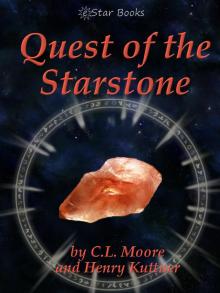 Quest of the Starstone
Quest of the Starstone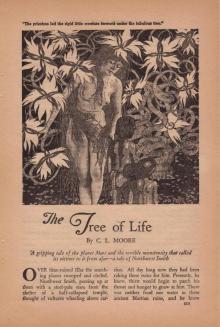 The Tree of Life
The Tree of Life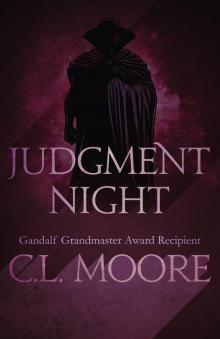 Judgment Night
Judgment Night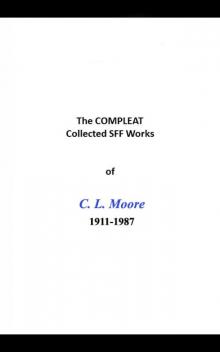 The COMPLEAT Collected SFF Works 1911-1987
The COMPLEAT Collected SFF Works 1911-1987 Northwest of Earth
Northwest of Earth No Boundaries
No Boundaries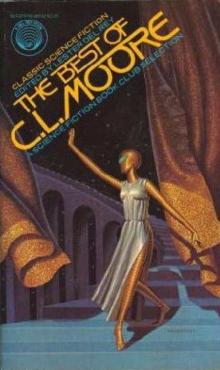 The Best of C. L. Moore
The Best of C. L. Moore Doomsday Morning M
Doomsday Morning M Shambleau and Others M
Shambleau and Others M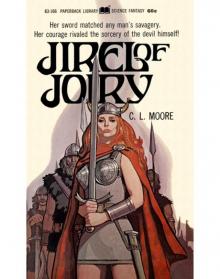 Jirel of Joiry
Jirel of Joiry Judgment Night M
Judgment Night M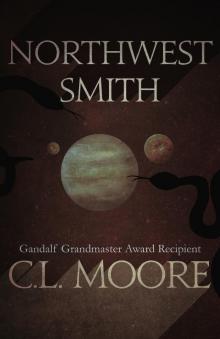 Northwest Smith
Northwest Smith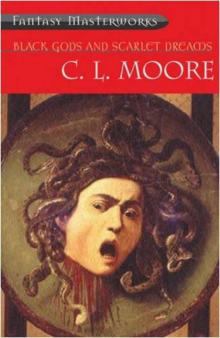 Black Gods and Scarlet Dreams
Black Gods and Scarlet Dreams